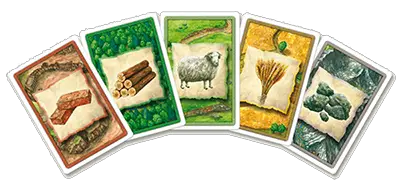

-
Produce all 5 resources.
Of course, it's often not possible in the beginning to get on every resource. Then place carefully so you can do:
- Build toward the fifth resource and build on it with your first expansion.
- Build toward a useful port.
- Place on large amounts of wheat, ore, and sheep. This way you can use development cards to acquire the needed resources.
If you're relying on other players for a key resource, all they have to do to stop you is stop trading you what you need.
-
Once you have four settlements, you have to consider to build a city than another settlement.
-
If you are playing first or second, I highly recommend getting on one of the 6 hexes first.
-
If for any reason, the 5/6/9 vertex is available in the game, take it.
-
Balance your compatible resources as this increase the ability to build quicker and more efficiently
Good balance means far fewer 4:1 (or 3:1) trades and fewer discards on a 7.

-
Bet high on Wheat and Ore because it makes the best spots more productive. It increases the ability to use development cards to stay unblocked.
-
People will keep telling you that Settlers is about the resources, but I promise you, it is about the numbers.
-
Since you play The Settlers of Catan with a variable map, the tactical considerations of each game are different.
There are some common points you should consider:
Brick and lumber are the most important resources at the beginning of the game. You need both to build roads and settlements. You should try to place at least 1 of your first settlements on a good forest or hills hex.
Do not underestimate the value of harbors. For instance, a player with settlements or cities on productive fields should try to build a settlement on the "grain" harbor.
Leave enough room to expand when placing your first 2 settlements. Look at your opponents' sites and roads before making a placement. Beware of getting surrounded!
If you plan to build toward a harbor, the middle of the island may be a tricky place for a starting settlement, for it can easily be cut off from the coast.The more you trade, the better your chances of victory. Even if it is not your turn.
-
Road placement at the beginning is also crucial. The biggest rookie mistake I see is someone pointing their road toward an extremely valuable slot. You know that someone is going to stick one of their first two settlements there, so why would you point a road down that direction?
-
Do not point your roads toward the center of the board. I play for the edges because I can guarantee my ability to put a settlement there.
-
Don't trade 4:1 or 3:1 for a card and simply holding onto it with a small hand size.
-
If someone wants to trade something and you are the only one offering, try to get them to wait until your turn to trade it.
-
Get the maximum out of your Development Cards

-
If you plan to build a road and buy a development card in the same turn, then always buy the development card first because you may get a road building card which saves you wood and bricks.
-
Always think what you need to do to win. Make up your plan and execute it. Think a few steps further. The key to understanding how to win the game isn't to work from front to back, it's to work from back to front.
-
Pay attention to your opponents. Try to find out what they need to do to win and try to prevent that.
Even if you're behind, anything that makes the game continue is good for you.
-
Use the robber well by knowing your opponents resources. Always make it seem like you can't win to convince others to put the robber on your opponents (the one with the most victory points).
-
The best way to avoid getting your critical card stolen is to properly pad your hand with other cards.
-
In a 3 player game and you hold 8 cards, there is a 42% chance that somebody will roll a 7 before each turn. In a 4 player game, it's even 52%.
-
Each roll of the dices is independent.
It's not because you have rolled a lot of 3s that you have now to block the 3 because it is hot. You should block everything the player need to compliment the 3. For example, if the 3 is ore, block their wheat hex because its likely they need wheat to pair with ore.
-
Get into the habit of counting other players' victory points every turn, and figuring out how they will probably act to get what they need to win. This may seem obvious, but most people do not do it.
-
Hide points to near the end if possible (do you really want the longest road with five segments, and being ahead in points that early on?). Or wait to put out that last knight if you can.
Continue Reading


